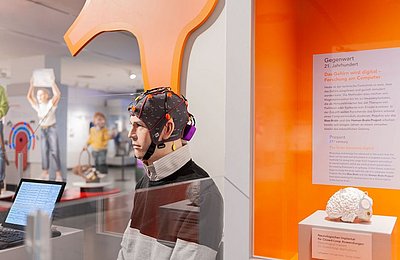Das Gehirn: Intelligenz, Bewusstsein, Gefühl
7. Oktober 2020, 18.30 Uhr Haus der Natur (Vortragssaal), Museumsplatz 5, Salzburg
Vortrag von Erika Mondria, PhD-Studierende und Lektorin bei Interface Cultures, im Rahmen der Vortragsreihe zur Sonderschau „Das Gehirn: Intelligenz, Bewusstsein, Gefühl“.
Die Vortragsreihe bringt aktuelle wissenschaftliche Erkenntnisse und Methoden der Gehirnforschung auf den Punkt! Expert*innen erklären und zeigen, wie sich Vorgänge im Kopf auf unser tägliches Leben auswirken.
Erika Mondria © Nuno Patricio
Durch reine Gedankenkraft die Hand einer anderen Person bewegen: Ist das möglich? Welchen Sinn könnte das haben? Anhand einer Live-Präsentation mit dem System recoveriX der Firma Guger wird Erika Mondria auf dieses Szenario eingehen.
Vorneweg werden an diesem Abend auch Grundkenntnisse über das Gehirn vermittelt. Basisfunktionen von Gehirn-Computer-Interaktionen bzw. Brain Computer Interfaces (BCI) werden erklärt, unterschiedliche Anwendungsmöglichkeiten in den Bereichen Kunst, Forschung und Medizin anschaulich dargelegt. Dazu gehören etwa auch biometrische Messmethoden, die es ermöglichen, bioelektrische Signale des Gehirns in digitale Schrift zu verwandeln.
Die Künstlerin und BCI-Expertin Erika Mondria leitet seit 2009 das BrainLab im Ars Electronica Center. Unter anderem forscht sie dabei an Möglichkeiten, um das wandelnde Feld der Neurowissenschaft und Gehirn-Computer-Interaktion anschaulich darzustellen. Der Abend wird vom Haus der Natur Salzburg veranstaltet. Die Teilnehmerinnen- und Teilnehmerzahl ist begrenzt.
Tickets: Kostenlos. Die Anmeldung erfolgt unter +43 662 8426530 oder office@hausdernatur.at
Erika Mondria has studied Fine Art & Cultural Studies at the Kunstuniversität Linz and the JKU (AT), Fine Art at London Institute (UK) and Marseille at Aix-Marseille Université (FR). She is a trained hypnotherapist and certified mental trainer.During the last 10 years Erika has managed and developed the BrainLab at the Ars Electronica Center and worked with various biometric measurement technologies such as eye tracking Retina photography and brain computer Interface. In 2019 she founded the artist collective: RIXLmemMatriX©. She is currently supervising brain projects at Ars Electronica and also conceives and implements interactive visitor programs in the fields of neuroscience and brain computer interface. Since 2018, her main focus is on art and science research within interactive art scenarios. Biometric measurement in art is part of her PHD thesis and the question about the reciprocity of human corporeality, the biometric metrology and the artistic staging.Her artistic approach has always been guided by the observation of the relationship between the inner world and the outer world, the reciprocity of outer conditions and inner body processes (e.g. the cultural imprinting of the body and their external implications).The subject of biometric technology in art and its capabilities, the physicality associated with it and in particular the internal and external perception of the body in interaction with artistic staging represent the main area of her artistic scientific research.
